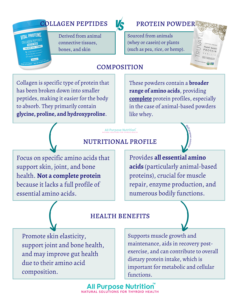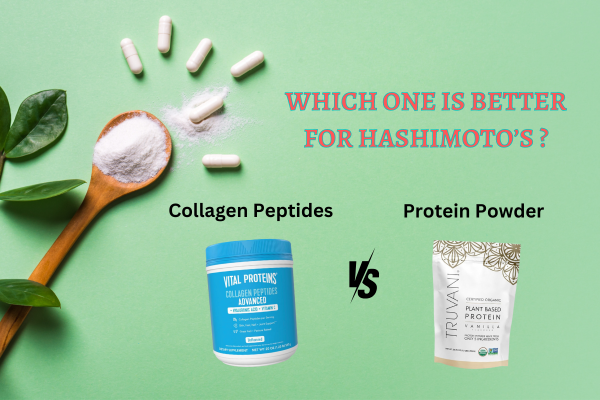When navigating the vast world of dietary supplements, it can be challenging to decide between collagen peptides and protein powders to support your health goals and Hashimoto’s hypothyroidism. Among the myriad of choices, collagen and protein powders stand out due to their popularity and potential health benefits. Each has unique attributes and applications, particularly important for those with Hashimoto’s, as your needs might include supporting tissue repair, managing inflammation, and maintaining overall health.
Understanding Collagen and Protein Powder
Collagen is a structural protein that forms the connective tissues throughout your body, including skin, bones, and joints. Collagen peptides, a form of collagen processed to be easily absorbed, provide specific amino acids like glycine, proline, and hydroxyproline, which are essential for the health and repair of your skin, joints, and gut lining.
Protein powders, on the other hand, come in various forms such as whey, casein, or plant-based options like pea and rice. These powders are designed to be a comprehensive source of essential amino acids necessary for muscle repair, recovery, and growth, as well as supporting metabolic functions and overall health.
Collagen: The Specialized Choice for Specific Needs
Collagen peptides are particularly beneficial for those looking to enhance their skin’s elasticity and strength, reduce joint pain, and potentially improve gut health—common concerns for individuals with Hashimoto’s. Given the autoimmune nature of Hashimoto’s, the anti-inflammatory properties of collagen can be particularly beneficial. The amino acids in collagen support the rebuilding of tissues and help maintain the integrity of the gut lining, a crucial aspect since gut health is often compromised in autoimmune conditions.
Protein Powder: The Muscle and Metabolism Booster
Protein powders are more than just a tool for athletes. For individuals with Hashimoto’s, maintaining muscle mass and metabolic health can be a challenge due to the metabolic slowdown associated with hypothyroidism. Protein powders help ensure you meet your daily protein requirements, which can support not only muscle growth and repair but also aid in hormone production and immune function—key areas affected by Hashimoto’s.

Comparing the Benefits: Which Should You Choose?
The decision between collagen and protein powder should be guided by your specific health objectives:
- For Skin, Joints, and Gut Health: Collagen peptides are unmatched. If your primary concerns are related to tissue repair or gut integrity, collagen offers targeted support that can make a significant difference in how you feel and function each day.Here is my personal choice.
- For Muscle Maintenance and Overall Nutrition: Protein powders offer a robust profile of essential amino acids, crucial for those looking to enhance their muscle strength and metabolic rate, which can be particularly beneficial for managing weight and energy levels in Hashimoto’s.A good option is HERE.
Can You Take Both?
Absolutely! In fact, using both collagen and a comprehensive protein powder can holistically support various aspects of health. Collagen can be taken in the morning with your coffee or smoothie to support your connective tissues and gut health, while a protein shake post-workout or with a meal can help meet your broader nutritional needs.
Tailoring Your Choice to Hashimoto’s
For those managing Hashimoto’s, the choice between collagen and protein powder isn’t just about personal preference—it’s about addressing the specific symptoms and challenges of the disorder. Collagen is particularly useful for combating the inflammation and tissue damage that can come with Hashimoto’s, while protein powders can help address the muscle wasting and energy dips caused by thyroid hormone imbalances.
Choosing the right supplement—or combination of supplements—is a strategic decision that can have a significant impact on your health and well-being. As always, it’s crucial to consult with a healthcare provider or a dietitian who understands your personal health history and can provide guidance tailored to your specific needs. With the right approach, both collagen and protein powder can be valuable tools in your journey toward better health with Hashimoto’s.
